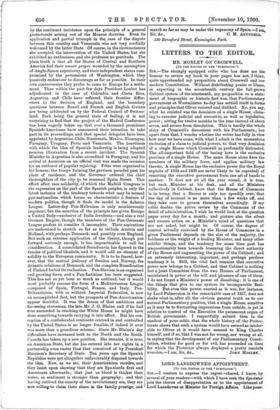LETTERS TO THE EDITOR.
MR. MORLEY ON CROMWELL.
[TO THE EDITOR OF THE "SPECTATOR."] " Sfa,—The strongly equipped critic who has done me the honour to review my book in your pages has not, I think, quite apprehended my proposition about Cromwell and our modern Constitution. Without distributing praise or blame, or expecting in the seventeenth century the full-grown Cabinet system of the nineteenth, my proposition as a state. ment of biographic or historic fact was, that Parliamentary government at Westminster to-day has settled itself in forms and principles that Oliver resisted and disliked. No, you say, what he resisted was the dominion of a single House, claim. ing to exercise judicial and executive, as well as legislative, power ; sitting for twelve months in the year instead of about seven, and secure from dissolution. This is hardly the whole story of Cromwell's discontent with his Parliaments ; but apart from that, I wonder whether the writer has fully in view how near we have come, with what I admit is the momentous exclusion of a claim to judicial powers, to that very dominion of a single House which Cromwell so profoundly distrusted. The all-important field of the taxing laws is the exclusive province of a single House. The same House alone fixes the numbers of the military force, and applies military law thereto. A single House has the exclusive power (for the Royal exploits of 1834 and 1839 are never likely to be repeated) of removing the executive government from one set of hands to another. It does not sit all the year round, it is true, but each Minister at his desk, and all the Ministers collectively in Cabinet, know that the House of Commons is in being, that a Recess is only too speedily over, that the day of account is no more than a few weeks off, and they take care to govern themselves accordingly. If my critic doubts the active review by the Commons of the detail of administration, I wish he would look at the question paper every day for a month; and picture also the silent and unseen action on a Minister's mind of questions that are not asked, but might be. Of course, the degree of control actually exercised by the House of Commons in a given Parliament depends on the size of the majority, the boldness or the weight of a leading Minister, and many other subtler things, and the tendency for some time past has unquestionably been towards lessening the direct authority of the House and augmenting the power of the Cabinet; and an extremely interesting, important, and perhaps perilous tendency it is. Still, the vital fact remains that executive power now belongs to a Cabinet, and that Cabinet is nothing but a joint Committee from the two Houses of Parliament, maintained in power at the will and pleasure of one of them. I do not forget a Minister's power of dissolving: it is one of the things that give to our system its incomparable flexi- bility. But even this power, exerted as it was, for instance, by Lord Palmerston in the remarkable case of 1857, does not shake what is, after all, the obvious general truth as to our normal Parliamentary position, that a single House, sensitive as it may be to fluctuating impressions from outside, is yet in relation to control of the Executive the paramount organ of British government. I respectfully submit then to the candour of your critic, that the whole history of the Protec- torate shows that such a system would have seemed as intoler- able to Oliver at it would have seemed to King Charles himself, and if so, that I was not far wrong, nor wrong at all, in saying that the development of our Parliamentary Consti- tution, whether for good or for evil, has proceeded on lines for which the Protector always displayed a pretty resolute






































 Previous page
Previous page